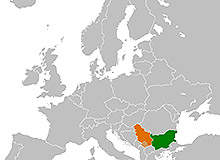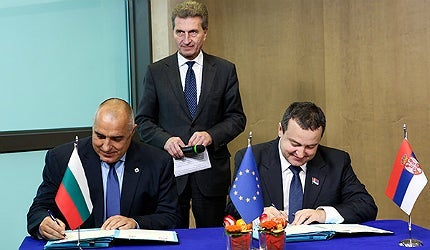
Gas Interconnection Bulgaria – Serbia (IBS) is a project which includes the construction of a 150km long pipeline which will connect the gas transmission networks of the two countries. The pipeline will run between Nis in Serbia to Dupnitsa, located near Bulgaria’s capital city of Sofia.
The pipeline will enable about 1.8 billion cubic metres (bcm) of natural gas to be delivered annually in both directions. The capacity of the pipeline will be expandable up to 4.5bcm/y.
Approval for building the pipeline is expected to be obtained in mid-2013, with construction commencing in early 2014. The pipeline is expected to commence operations in 2015. The project is expected to cost €48m ($62.5m).
IBS is one of many projects being undertaken by the Bulgarian Government to increase the security of supply in the region. Bulgaria imports 90% of its natural gas from Russia, the majority of it through Ukraine.
Gas Interconnection Bulgaria – Serbia project history
A dispute between Ukraine and Russia interrupted gas supplies to Bulgaria for two weeks in 2009. The interruption revealed the weaknesses in the gas transmission network in south-eastern Europe (SEE). In the wake of such incidents, interconnections have been identified as the best solution to ensure the security of supply.
SEE countries have, therefore, launched several interconnection projects to increase the security of supply. Bulgaria, in particular, is implementing several interconnection projects linking Romania, Greece and Turkey. The pipeline linking Romania is expected to be completed in 2013 and the pipeline linking to Greece will be operational in 2015.
In January 2012, Gastec was contracted to carry out the Environmental Impact Assessment (EIA) and feasibility study for the IBS project. An Operational Programme Competitiveness (OPC) has been set up to secure financing for the project. About 90% of the funds for the project will be provided under the OPC.
In December 2012, the governments of Bulgaria and Serbia signed a Memorandum of Understanding to create a gas interconnection between the two countries. A contract was subsequently signed during the same month between the Ministry of Economy, Energy and Tourism (MEET) and the Ministry of Regional Development and Public Works of Bulgaria, to design the interconnection. A preliminary agreement to build the pipeline was signed in 2010.
The feasibility study for the project was completed in January 2013. An operator for the project has not been chosen yet. A joint venture is expected to be created to operate the interconnection. Bulgartransgaz is providing technical expertise for implementation of the project.
Details of the European gas interconnection
The IBS pipeline will have a diameter of 28in and operate at a working pressure of 55 bar. Four routes have been developed for the pipeline, of which the second route is being favoured. The second route starts in Novi Iskar in Serbia and passes through the regions of Kostinbrod, Slivnitsa and Dragoman, before ending in Sofia.
The design of the pipeline will be based on a gas ring concept. The Serbian section of the pipeline will be 100km long and will include branch lines in Slivnitsa, Godech and Dragoman in Bulgaria.
IBS pipeline and gas transmission network benefits
The project will help in solving the problem of a lack of interconnectivity in the region.
It will provide a direct link for the gas networks of Bulgaria, Romania, Greece and Hungary to the gas networks of other SEE countries.
With the implementation of the project, Bulgaria will be able to diversify its sources of natural gas and reduce its dependence on one source.
Bulgaria will be able to gain access to the gas hub in Austria, as well as Hungarian gas storage facilities. In addition, operators will be able to balance their transmission capacity and use underground gas storage facilities to regulate supplies.
The project is also expected to create jobs and support economic recovery of the region, especially Serbia.
Related content
Nord Stream Gas Pipeline (NSGP), Russia-Germany
The Nord Stream Gas Pipeline (NSGP) project is operated by Nord Stream AG.
NIS Pancevo Refinery, Serbia
Naftna Industrija Srbije’s (NIS) Pancevo refinery is situated in South Vojvodina, Serbia.




